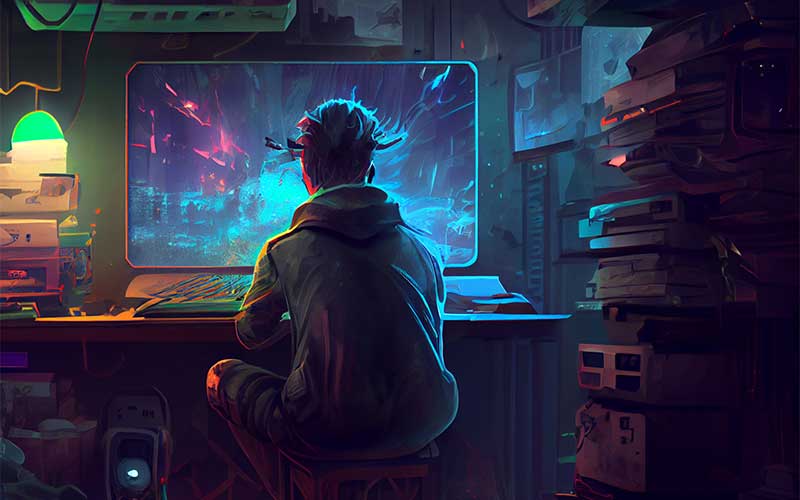Gaming as a Social Phenomenon: The Evolution of Interactive Entertainment
Gaming has come a long way since its humble beginnings, evolving from a solitary pastime to a thriving social activity that connects people across the globe. This article will explore…
Gaming has come a long way since its humble beginnings, evolving from a solitary pastime to a thriving social activity that connects people across the globe. This article will explore the journey of gaming as a social activity, examining its various stages of development and discussing its impact on the way we interact with others through interactive entertainment.
Early Days of Social Gaming: Arcades and Local Multiplayer
In the early days of gaming, arcades served as social hubs where players could gather, compete, and bond over shared experiences. Games like Pong, Space Invaders, and Pac-Man attracted crowds of enthusiasts eager to challenge one another and set new high scores.
The introduction of home gaming consoles brought local multiplayer gaming to the forefront, with titles like Super Mario Bros., Street Fighter, and GoldenEye 007 fostering friendly competition and collaboration among friends and family members.
The Rise of Online Multiplayer Gaming
The advent of the internet and online gaming ushered in a new era of social interaction, as players from all around the world could connect, communicate, and compete in real-time. Games such as Ultima Online, EverQuest, and World of Warcraft pioneered massively multiplayer online (MMO) experiences, creating vast virtual worlds where thousands of players could coexist and collaborate.
Online multiplayer gaming expanded beyond MMOs, with first-person shooters like Counter-Strike, Halo, and Call of Duty becoming popular competitive arenas for players worldwide.
Social Networking and Mobile Gaming
The rise of social networking platforms like Facebook and the widespread adoption of smartphones brought gaming to an even broader audience. Social games like FarmVille, Candy Crush Saga, and Words With Friends allowed users to connect with friends and compete for high scores, while also introducing a new wave of casual gamers to the world of interactive entertainment.
Esports and Gaming Communities
Competitive gaming, or esports, has grown rapidly in popularity, with professional players and teams competing in high-stakes tournaments for games like League of Legends, Dota 2, and Overwatch. Esports events are attended by thousands of fans and watched by millions online, further solidifying gaming as a social phenomenon.
Gaming communities have also flourished, with forums, websites, and social media groups dedicated to specific games, genres, and platforms, enabling fans to share strategies, discuss updates, and celebrate their shared passion for gaming.
Virtual Reality and Social Interaction
Virtual reality (VR) technology has the potential to revolutionize social gaming, offering immersive experiences that blur the lines between the virtual and real worlds. Social VR platforms like VRChat and Rec Room allow users to create avatars, engage in activities, and interact with others in shared virtual spaces, fostering a new level of social interaction in gaming.
The Impact of Streaming Platforms on Gaming Culture
The rise of streaming platforms like Twitch and YouTube Gaming has had a profound impact on gaming culture, transforming the way players consume and share content. Streamers can broadcast their gameplay, build communities, and interact with viewers in real-time, further solidifying the social aspect of gaming.
The Future of Social Gaming
As technology continues to advance, gaming will likely become even more intertwined with social interaction. Advances in VR, augmented reality (AR), and cloud gaming will offer new opportunities for collaborative and competitive experiences, while AI-driven NPCs and virtual assistants may enable more personalized and dynamic social interactions within games.
The integration of gaming with other forms of media, such as movies, TV shows, and music, could lead to unique cross-platform experiences that engage users on multiple levels. In addition, the rise of metaverse platforms, like Roblox and Fortnite, hint at the future of gaming as a social and creative space where users can not only play but also build, explore, and connect with others.
Conclusion
Gaming has evolved significantly as a social activity, from its roots in arcades and local multiplayer to the global online communities and immersive virtual experiences of today. As technology continues to advance and reshape the gaming landscape, the social aspects of interactive entertainment will likely continue to grow and evolve, offering new opportunities for connection, collaboration, and competition.
FAQs
- How did gaming begin as a social activity? Gaming began as a social activity in arcades, where players would gather to compete and share experiences. Local multiplayer games on home consoles furthered this social aspect, enabling friends and family to play together.
- What impact did online gaming have on the social aspect of gaming? Online gaming allowed players from all around the world to connect, communicate, and compete in real-time, broadening the scope of social interaction in gaming and giving rise to MMOs and competitive online multiplayer games.
- How have social networking and mobile gaming contributed to the social aspect of gaming? Social networking platforms and mobile gaming have made gaming more accessible and social, introducing casual games that allow users to connect with friends and compete for high scores.
- What is the role of esports and gaming communities in the social aspect of gaming? Esports and gaming communities have helped solidify gaming as a social phenomenon by fostering competition, collaboration, and shared passion among fans, with esports events attracting large audiences and gaming communities providing spaces for discussion and camaraderie.
- How might the future of social gaming evolve? The future of social gaming could be shaped by advances in VR, AR, cloud gaming, AI-driven NPCs, and virtual assistants, as well as the integration of gaming with other forms of media and the rise of metaverse platforms, offering new opportunities for social interaction and creative expression.

